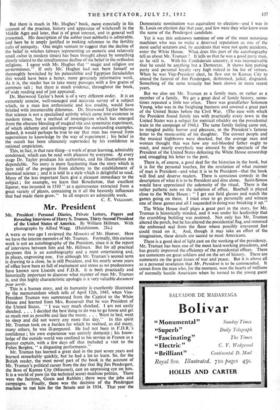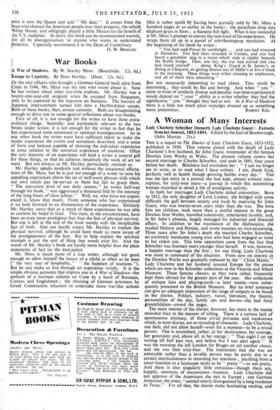Mr. President
Mr. President : Personal Diaries, Private Letters, Papers and Revealing Interviews of Harry S. Truman, Thirty-Second President of the United States of America. By William Hillman. With photographs by Alfred Wagg. (Hutchinson. 21s.) A WEEK or two ago I reviewed the Memoirs of Mr. Hoover. Here we have the interim memoirs of Mr. Truman. Formally, this curious work is not an autobiography of the President, since it is the report of interviews between him and Mr. Hillman. But for all practical purposes this is an autobiography and a most entertaining and, in places, engrossing one. For although Mr. Truman's second term is drawing to a close, he is still President, and his nearly seven years of office have been as full of excitement and stress as no predecessors have known save Lincoln and F.D.R. It is both practically and historically important to discover what manner of man Mr. Truman is, and this highly characteristic apologia is a very valuable document pour servir. This is a human story, and its humanity is excellently illustrated by the memorandum which tells of April 12th, 1945, when Vice- President Truman was summoned from the Capitol to the White House and learned from Mrs. Roosevelt that he was President of the United States. " I was very much shocked. I am not easily shocked. . . . I decided the best thing to do was to go home and get as much rest as possible and face the music. . . . Went to bed, went to sleep and did not worry any more that day." In this spirit Mr. Truman took on a burden for which he realised, as did many, many others, he was ill-prepared. He had not been in F.D.R.'s confidence ; his own experience was entirely domestic ' • his know- ledge of the outside world was confined to his service in France as a gunner captain, with a few days off that included a visit to the Folies Bergere, " a disgusting performance." Mr. Truman has learned a great deal in the past seven years and learned remarkably quickly, but he had a lotto learn. So, for the British reader, the most novel part of the book is the account of Mr. Truman's political career from the day that Big Jim Pendergast, the Boss of Kansas City (Missouri), cast an appraising eye on him. It is a world of pure (in the technical sense) machine politics. There were the factions, Goats and Rabbits ; there were the jobs and campaigns. Finally, there was the decision of the Pendergast machine to run him for the Senate seat in 1934. That year the Democratic nomination was equivalent to election—and I was in St. Louis on election day that year, and few were they who knew even the name of the Pendergast candidate.
Yet it was this unknown nominee of one of the most notorious machines who was to make a deserved reputation as one of the most useful senators and, by accidents that were not quite accidents, enter the White House. What does this part of the autobiography tell us about Mr. Truman ? It tells us that he was a good party man, as he still is. With his Confederate ancestry, it was inconceivable that he could be anything but a Democrat. It shows him putting party and personal loyalty very high indeed in his list of virtues.. When he, was Vice-President elect, he flew out to Kansas City to attend the funeral of Jim Pendergast, dethroned, jailed, disgraced. Something of the same tenacity has been shown in more recent years.
But we also see Mr. Truman as a family man, or rather as a member of a family. We get a great deal of family history, some- times repeated a little too often. There was grandfather Solomon Young, who was in the freighting business and covered a great part of the United States before the Civil War. (The ease with which the President found family ties with practically every town in the United States was a subject for metrical ribaldry on the presidential train in the campaign of 1948.) The same family feeling came out, to mingled public horror and pleasure, in the President's famous letter to the music-critic of his daughter. The correct people and the musical highbrows were shocked, but the average man and woman thought that was how any red-blooded father ought to react, and nearly everybody was amused by the spectacle of the President of the United States defeating the White House censorship and smuggling his letter to the post.
There is, of course, a good deal for the historian in the book, but it is for the personal touches, for the revelation of what manner of man is President—and what it is to be President—that the book will find and deserve readers. There is conscious comedy in the description of what it is to be President and dine alone. Saint-Simon wquld have appreciated the solemnity of the ritual. There is the rather pathetic note on the isolation of office. Baseball is played close to the White House : " I get out field glasses and watch the games going on there. I tried once to go personally and witness one of these games and all I succeeded in doing was breaking it up."
The White House itself plays a great part in the story, for Mr. Truman is historically minded, and it was under his leadership that the crumbling building was restored. Not only has Mr. Truman altered the porch, but he has altered the presidential flag, and removed the embossed seal from the floor where possibly irreverent feet could tread on it. And, though it may take an effort of the imagination, these details are sacred to most Americans.
There is a good deal of light cast on the working of the presidency. Mr. Truman has been one of the most hard-working presidents, and has greatly improved the efficiency of the presidential offices. There are comments on great soldiers and on the art of history. There are comments on the great issues of war and peace. But it is above all as a personal revelation that Mr. President is to be commended. It comes from the man who, for the moment, won the hearts of millions of normally hostile Americans when he turned to the young guest
Ewho is now the Queen and said "'My dear." It comes from the an who showed the American people over their property, the rebuilt hite House, and obligingly played a little Mozart for the benefit of the T.V. audience. In short, this book can be recommended warmly, (Et or all its disorganisation, to anyone who wants to understand merica. I specially recommend it to the Dean of Canterbury.
D. W. BROGAN.



































 Previous page
Previous page